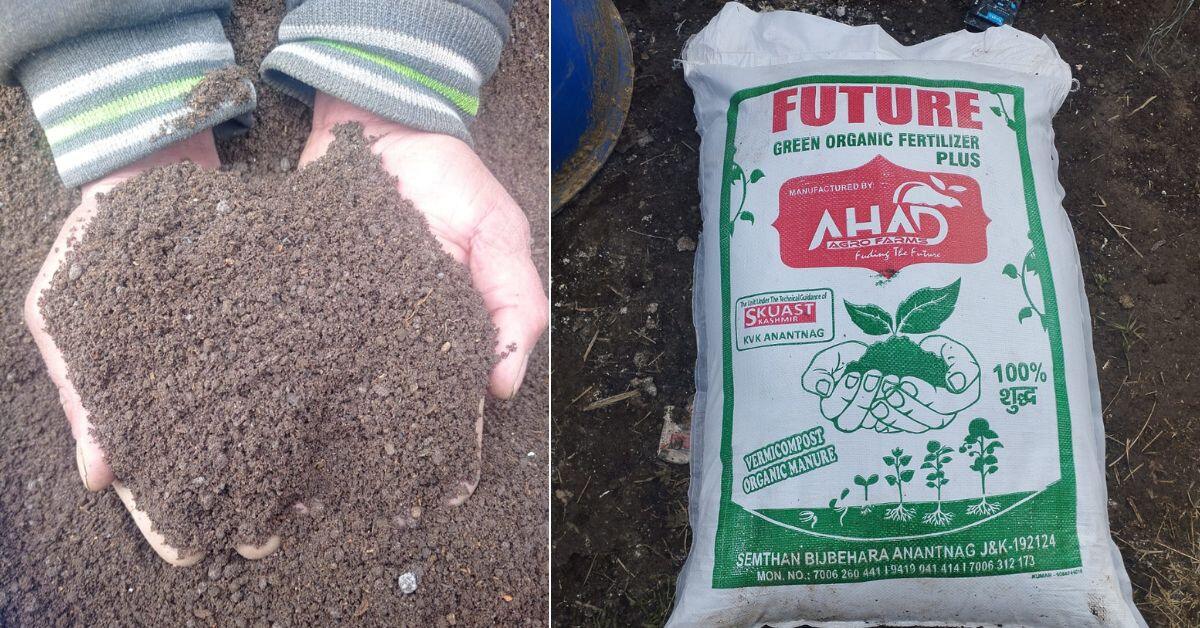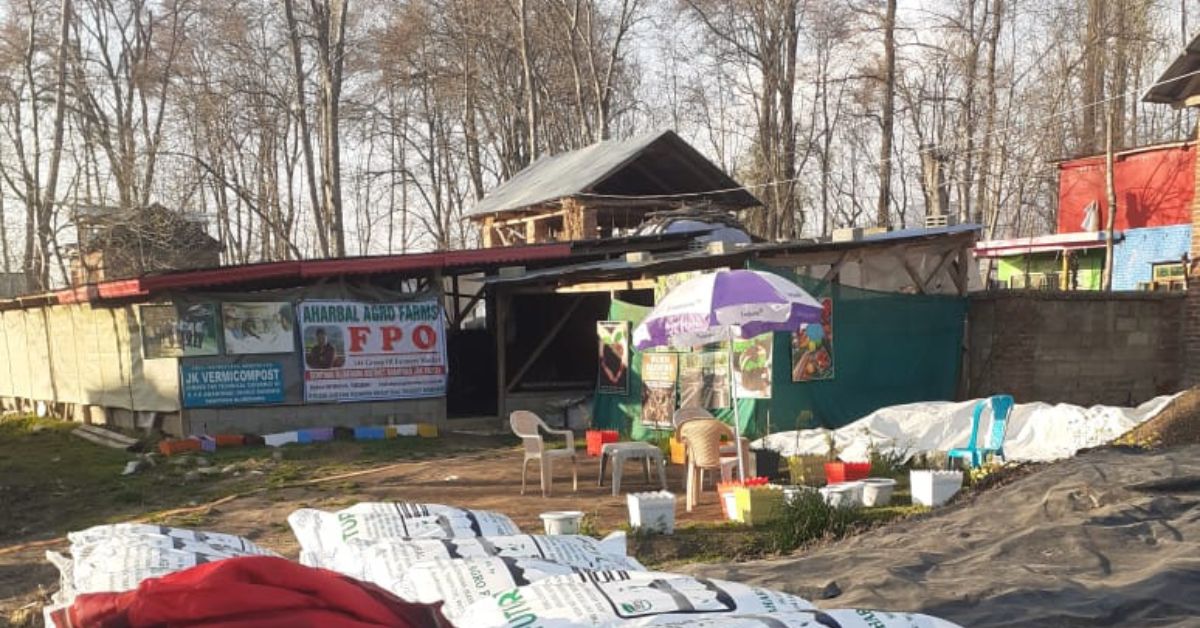Kashmir’s Anantnag district is celebrated for its lofty mountains with snowy peaks, sweet waters of its springs and streams, while apple and walnut orchards have been dotting its fertile valleys for decades.
However, indiscriminate usage of chemical fertilisers and pesticides started degrading soil quality and water bodies in the region. “While farmers relentlessly used chemicals to get more production in less time, it gradually destroyed our soil to an extent that it started losing its richness,” Abdul Ahad Lone tells The Better India.
Abdul’s family was among one of these farmer families until 2002 when he converted his 40 kanal (5 acres) land into an organic farm. To achieve this, the progressive farmer learned to make vermicompost – worm manure that enhances soil structure, fertility, and drainage.
With vermicompost, not only did Abdul improve his farmland fertility but also turned it into an additional source of income. Today, the farmer makes vermicompost in 1,000 beds with a daily production of five tonnes, earning him a daily income of Rs 50,000. Last year, his annual turnover was Rs 1.5 crore!

Boarding the gravy train
It was in 1996 that Abdul first heard of organic farming. On a train journey from Mumbai to Kashmir, Abdul met an organic farmer from Sikkim who explained the long-term perils of inorganic farming. Although the train journey came to an end, he embarked on a new path to adopt organic farming in his family farm.
“I remained in touch with Swagata. Back then, there was no YouTube, so we would discuss organic farming methods on the landline network. In 2002, she advised me to prepare vermicompost to get more production from the organic farm,” he says.
“Vermicompost is rich in nitrates and minerals such as phosphorus, magnesium, calcium, and potassium. These work as excellent organic fertilisers and enhance soil quality,” he says.
The progressive farmer went on to take a 15-day training from the Krishi Vigyan Kendra, Anantnag, to understand the nitty-gritty of vermicompost making. “I was a curious farm boy. The training increased my interest to implement the learnings,” he says.

Utilising raw materials – cow dung, agricultural and kitchen waste – available at home, Abdul began preparing vermicompost for his organic farm. For this, he spent Rs 10,000 to establish a small shed, a pit, and tarpaulin sheets. He used organic manure and much to his expectation, Abdul got double production from his farm of apples, walnuts, paddy, vegetables, maize, and peaches. The production kept increasing day by day.
Empowering unemployed villagers with waste
Seeing his success, local farmers started frequenting Abdul’s production unit to understand the benefits of vermicompost. “Gradually, they started buying vermicompost in small quantities from me. The demand grew when they observed good production compared to inorganic farming,” he adds.
Abdul felt that the vermicompost had the potential to be turned into a business. By 2009, he scaled up the work to a commercial level and started selling worm manure under the label Ahad Agro Farms. Soon after, his sales surged and he started getting repeat orders from local farmers.
To cater to the demand, he constructed 350 vermi beds. “I prepare vermicompost using the bed method where composting is done on the kaccha floor by making beds of organic manure. Earlier, I used to prepare it in cemented pits but had to discard this method as it did not provide a safe environment for worms to thrive,” he says.
“Worms require optimum heat to survive in the harsh winter of Kashmir. There was a time when I found most of my worms to be dead. However, there was one cemented pit that was kaccha in one corner. The worms had found their way into the soil through it and survived the winter. This gave me an idea to keep them in open beds so that they seep into the ground when it snows outside and come out in summer,” he adds.

Abdul manages to sell at least 5 tonnes of vermicompost daily to local farmers in Jammu and Kashmir. With his efforts, almost the entire Simthan village has discarded chemical fertilisers to use organic manure.
Annually, he manufactures 36,000 bags of 50kg each. “But there is a huge demand for vermicompost in entire Kashmir. With the current production, I am catering to only 10-15 villages. I am planning to boost production to 1 lakh bags now,” he adds.
Using his business model, Abdul has also encouraged unemployed residents in his village to take up the vermicompost business by giving free training. As of now, around 25 rural youth and 150 women homemakers trained by him are running their units across Kashmir.
For his work, Abdul has received several national-level awards including the Progressive Farmer and the Entrepreneur Award by the Government of India.
He has also received the best farmer award by the Krishi Vigyan Kendra, Sher-e-Kashmir University of Agricultural Sciences and Technology of Kashmir (SKUAST-K), and recognition by the Haryana, Delhi, and Gujarat governments.
“I am humbled to get recognition from so many states. As part of it, I met many ministers and governors but my real award is to empower these homemakers and rural youth who are now earning char paise (additional income) from what was a waste to them. Earlier, they would get Rs 100 by selling 50 kg of cow dung, but now they are earning Rs 400 by just converting it into vermicompost. It gives me immense satisfaction when I pay them,” he adds.
Edited by Padmashree Pande. All photos: Abdul Ahad Lone.
No comments:
Post a Comment